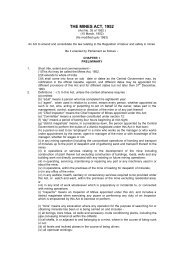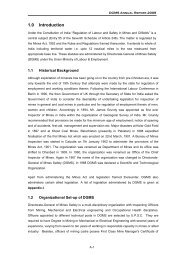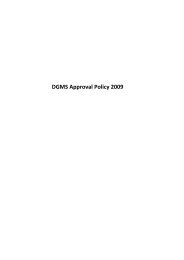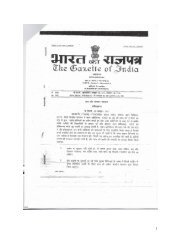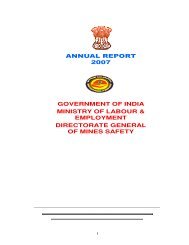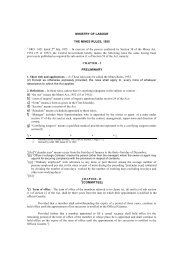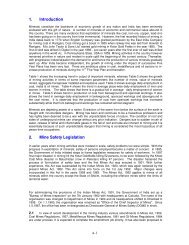India - Constitution - Directorate General of Mines Safety
India - Constitution - Directorate General of Mines Safety
India - Constitution - Directorate General of Mines Safety
You also want an ePaper? Increase the reach of your titles
YUMPU automatically turns print PDFs into web optimized ePapers that Google loves.
<strong>of</strong>ficer <strong>of</strong> the Court authorised by the Chief Justice to makerules for the purpose:Provided that the rules made under this clause shall, so far asthey relate to salaries, allowances, leave or pensions, requirethe approval <strong>of</strong> the Governor <strong>of</strong> the State (41)(3) The administrative expenses <strong>of</strong> a High Court, including allsalaries, allowances and pensions payable to or in respect <strong>of</strong>the <strong>of</strong>ficers and servants <strong>of</strong> the Court, shall be charged uponthe Consolidated Fund <strong>of</strong> the State, and any fees or othermoneys taken by the Court shall form part <strong>of</strong> that Fund.Article 230 Extension <strong>of</strong> jurisdiction <strong>of</strong> High Courts to Unionterritories(1) Parliament may by law extend the jurisdiction <strong>of</strong> a HighCourt to, or exclude the jurisdiction <strong>of</strong> a High Court from, anyUnion territory.(2) Where the High Court <strong>of</strong> a State exercises jurisdiction inrelation to a Union territory, -(a) nothing in this <strong>Constitution</strong> shall be construed asempowering the Legislature <strong>of</strong> the State to increase, restrict orabolish that jurisdiction; and(b) the reference in article 227 to the Governor shall, in relationto any rules, forms or tables for subordinate courts in thatterritory, be construed as a reference to the president.Article 231 Establishment <strong>of</strong> a common High Court for two ormore States(1) Notwithstanding anything contained in the precedingprovisions <strong>of</strong> this Chapter, Parliament may by law establish acommon High Court for two or more States or for two or moreStates and a Union territory.(2) In relation to any such High Court, -(a) the reference in article 217 to the Governor <strong>of</strong> the Stateshall be construed as a reference to the Governors <strong>of</strong> all theStates in relation to which the High Court exercises jurisdiction;(b) the reference in article 227 to the Governor shall, in relationto any rules, forms or tables for subordinate courts, beconstrued as a reference to the Governor <strong>of</strong> the State in whichthe subordinate courts are situate; and(c) the references in articles 219 and 229 to the State shall beconstrued as a reference to the State in which the High Courthas its principal seat:Provided that if such principal seat is in a Union territory, thereferences in articles 219 and 229 to the Governor, PublicService Commission, Legislature and Consolidated Fund <strong>of</strong> theState shall be construed respectively as references to thePresident, Union Public Service Commission, Parliament andConsolidated Fund <strong>of</strong> <strong>India</strong>.Chapter VI Subordinate CourtsArticle 233 Appointment <strong>of</strong> district judges(1) Appointments <strong>of</strong> persons to be, and the posting andpromotion <strong>of</strong>, district judges in any State shall be made by theGovernor <strong>of</strong> the State in consultation with the High Courtexercising jurisdiction in relation to such State.





